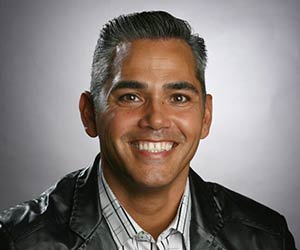
With nearly 25 years of military experience in the Army and Air National Guard, Doctor of Business Administration (DBA) graduate Dr. Daniel Rodarte knows a thing or two about sacrifice and duty. What he wasn’t prepared for when he embarked on his DBA journey was just how much he would need to tap into that motivation and drive, instilled by his parents and honed during his time in the military, to achieve his doctoral degree.
“Intellectually, I understood it would be challenging and very taxing, but I didn’t fully realize the non-financial brass tacks of committing to the program until I was mid-program,” he says of the all-consuming experience.
Dr. Rodarte is a second-generation American from California. His grandfather was born in Mexico and moved to California, where his father grew up in migrant fields and learned English as his second language. His parents don’t have college educations; his mom didn’t graduate high school. As a teen, he didn’t even know master’s degrees existed. “I personally didn’t have this in my pedigree, but as I started to get into academia and hit the books, I learned there was so much more beyond my little world and how I defined it,” he says.
While serving as an Air National Guardsman, Dr. Rodarte spent nearly 10 years in corporate America—in financial services and rising to assistant vice president of a contact center in Olympia, Washington—before finding the right time to pursue his DBA. “I was drawn to Walden’s international classroom and focus on social responsibility, which paralleled my time as a guardsman, where we worked with businesses and built partnerships with communities,” he says. “My doctorate gives me a stronger platform to help educate and make real change.”
His passion is to champion change and influence organizational process beyond the local level. He now serves as inspector general at the National Guard Bureau, a subset of the Department of Defense, where he is putting his DBA to good use. He is part of the administrative investigative team that reviews allegations of wrongdoing or violation related to the 54 states and territories. The team conducts research to determine if there was wrongdoing, and publishes findings that include a set course of actions to correct the wrongdoing. “My leadership is currently using the research and analysis skills I developed through my DBA program to start normalizing a vision and strategy for the office that has been potentially missing to an extent.”
Like others, Dr. Rodarte learned to make his DBA a priority, which included many sacrifices to achieve excellence. “I didn’t know anyone else who had gone through this journey and could give me insider details,” he says. Now he thinks it’s important for doctoral students and those considering a DBA to fully understand what’s involved. His advice?
- Get real quickly. Prepare yourself and those around you for what it’s going to be like. Have real conversations with friends, family, and colleagues who make up your support network. “After graduation, my wife and I were reflecting and realized we never formally sat down and really talked through the sacrifices this experience could have on our relationship. I’m blessed to have a champion as my best friend,” he says of his 23-year marriage.
- Stick with it despite inevitable change. A lot can happen in the time it takes to earn a doctoral degree. “My wife and I lived bicoastal for almost 2 years as I moved to the Washington D.C. area and started two different jobs while earning my degree,” he recalls. Challenges arise, but setting the plan, revisiting your motivation, and dutifully sticking to it will help you move past overly challenging moments. “Don’t hesitate to take planned leave and invest in your academic product with equal investment as you would a work product; after all, an investment in yourself is a good investment.”
- Share your progress. The doctoral journey is often elusive for those who have not experienced it personally. “My friends and family knew I was pursuing my DBA, and outwardly they understood that I was never available,” he says. “It wasn’t until I started posting milestones on my Facebook page, with a brief explanation and steps, that it began clicking for them. Ultimately, I learned it’s my duty to educate all of the people in my life.”



